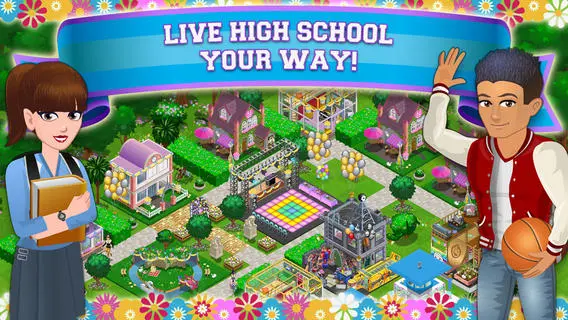[As a foreword, I know this isn't normally the type of content you expect to see on GameRevolution, one of the more hardcore gaming sites on the Internet. Still, with gamers getting progressively older, this is an interesting topic for the future of games both as a medium that can help people discover new things about themselves and as a level playing field that enables new discussions on old issues.]
High School Story tries to broaden the discussion about bullying by giving kids and parents an opportunity to build their own high school from the ground up. Players also get a chance to join the football team, plan homecoming activities, and go on dates. Through this, kids have an opportunity to learn how to confront bullies. Even if it doesn't sound like a title you'd want to play in between Call of Duty matches, it's at the forefront of socially impactful games.
As a high school loser who ended up playing both sides of bullying, I wanted to know more. We asked creator Oliver Miao a few questions about his game to get a better sense of how it helps young people cope with and overcome a bullying epidemic that seems to follow kids home on social media and other forms of communication, even online games.
GR: What inspired you to make this game?
Oliver Miao: Previously, I had worked on a game called Surviving High School. This genre is really exciting to us because high school is a period of personal growth for teens, and for writers there's a lot of interesting themes to explore. So when my co-founders and I created Pixelberry Studios, we wanted to return to that rich, engaging setting.
From the beginning, we knew we wanted to incorporate social issues and educational topics into the game. We added interactive features and a diverse cast so that our players would relate to the game as much as possible. But we had never thought about cyberbullying until we read about the tragic stories of Rebecca Sedwick and Audrie Pott, and my colleagues' and my reflections on our own experiences with bullying were the motivation for us to address cyberbullying.
GR: With the ubiquity of Facebook and other forms of social media, have you personally seen or been affected by cyberbullying?
OM: Many of my colleagues and I were bullied as children—or had even ended up bullying others ourselves. Those experiences motivated us to create the anti-bullying campaign. Many teens just need someone to talk to and be reassured that things can get better. We wanted to create a game that first was fun and engaging, but also told players that if they're having a bad experience in high school right now, it's OK to ask for help.
Amidst the tragic stories of Audrie Pott and Rebecca Sedwick, there were also some key statistics that motivated us to write this storyline: according to the CDC, one in six American teens is bullied at school every year, and one in seven teens seriously considers suicide every year. We knew if we could help even a fraction of those teens, then our campaign would be a success.
Also, while we were developing the campaign, a player contacted us through our in-game tech support system and said she was planning to kill herself. We were shocked, and didn’t know exactly what to do. So we reached out to the National Suicide Prevention Hotline, and they helped guide our conversation with the player and direct her to get help. A week after that experience, she came back to us she and said was getting help, and that if it wasn’t for our game, she wouldn’t be here. It was a really tough, but gratifying experience that inspired us to make our special cyberbullying content as accurate and as supportive as possible.
GR: What could parents and school administrators learn from playing High School Story themselves?
OM: The good thing about high school is that it’s a setting people of all ages–even adults–can relate to. Since our cyberbullying content is based so closely on real-life situations we’ve learned about from Cybersmile, the game can show parents and administrators some of the difficult social issues their kids are facing. We also hope the game can help trigger difficult conversations about cyberbulling and depression between adults and teens. From a big picture view, we also want to show people that games can have a positive impact.
GR: Do you have children and have they played High School Story? If so, what have you learned from seeing them play the game?
OM: My two co-founders and I all have preschool age children. They're a bit young to play the game now, but when creating High School Story our goal was to make a game we'd be proud of our children playing as they get older.
In reading player reviews of our game, we've learned that our cyberbullying quest really resonates with them. They love the fact that we're attacking an issue that personally affects them and their friends. With the support of our players, we've been able to donate over $200,000 to Cybersmile.
GR: How does High School Story encourage discussion between children and parents or school administrators?
OM: One of the main strategies players learn in High School Story's cyberbullying quest is that talking to an adult is the best way to stop any type of bullying. We back up this message by showing the negative consequences of trying to confront bullies head-on and the positive results of talking to an adult. This strategy and presentation was developed in collaboration with The Cybersmile Foundation, a UK anti-cyberbullying charity we partnered with for this campaign.
Every week, over 100 players reach out to Cybersmile because of our game. These are often players who are being bullied, self-hurting, or thinking about suicide. We believe that countless more teens are also reaching out to parents and other adults in their life for help, too.

GR: Have schools taken up the cause and allowed access to High School Story during class? Have you taken the game to schools and what has the reaction been so far?
OM: Last month, I was given the honor of speaking at my former high school, Torrey Pines, about my experience, High School Story, and how to address bullying. It was a wonderful experience. In addition to all the positive feedback we've gotten from players, it was great to just be able to connect with people at my former school and see how excited they were with what we're doing.
Instead of talking to most schools about our game, we've instead been expanding the number of platforms students can play High School Story on. We're really excited to be launching the game on the Kindle Fire. Already two million players have played our cyberbullying quests and by getting the game onto Kindle we're looking forward to making a difference with millions more players.
GR: Thanks, Oliver!











